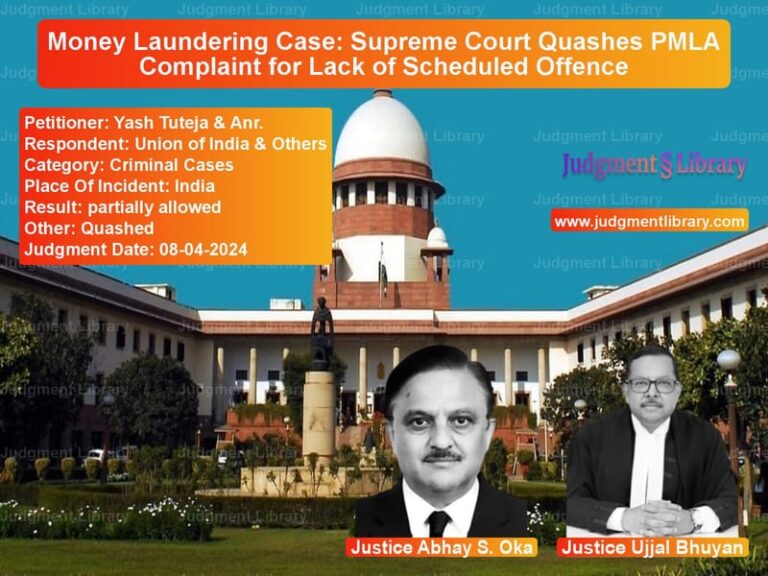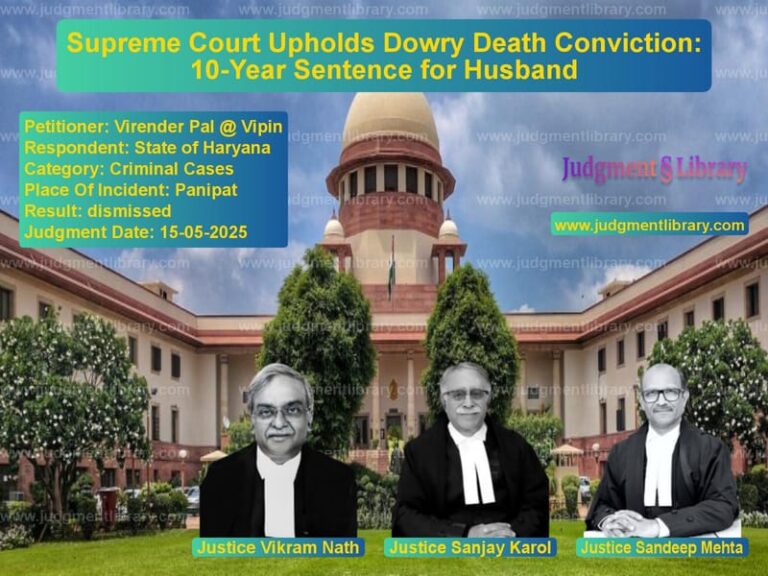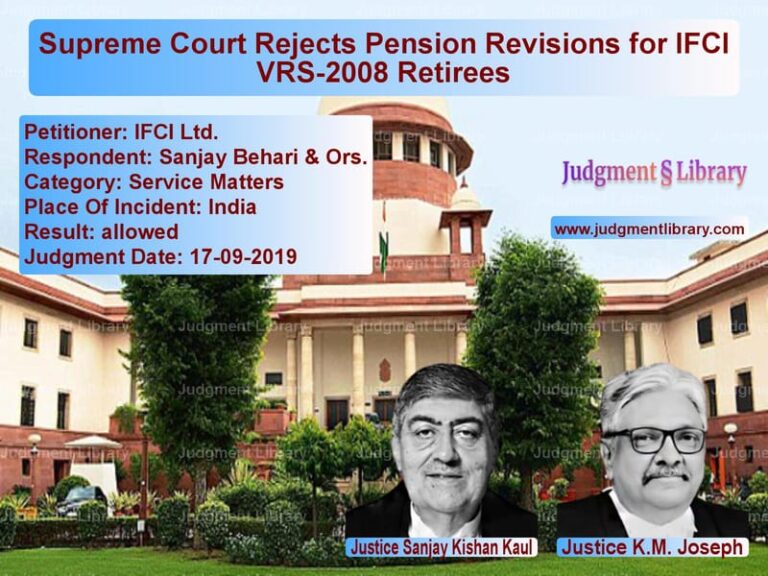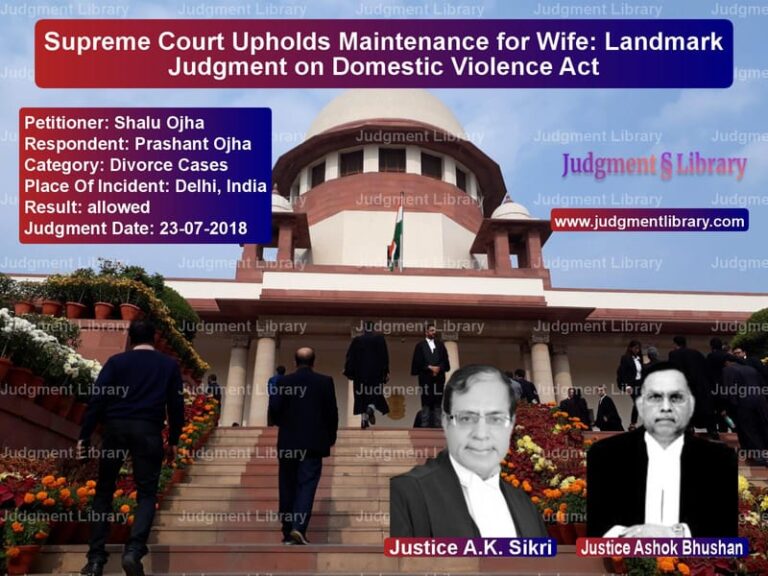Supreme Court Upholds Private Bus Operators’ Rights in Karnataka: Landmark Ruling on Transport Permits
In a significant ruling, the Supreme Court of India has upheld the rights of private bus operators in Karnataka by striking down restrictions imposed by the Karnataka State Road Transport Corporation (KSRTC) and the State Government on the issuance of contract carriage permits. The judgment clarifies the scope of delegation powers under the Motor Vehicles Act, 1988, and affirms the constitutional validity of repealing the Karnataka Contract Carriages (Acquisition) Act, 1976.
Background of the Case
The case arose from multiple appeals challenging the Karnataka High Court’s 2011 decision that ruled against the delegation of transport permit-granting powers to the Secretary of the State Transport Authority (STA). The appeals were filed by private bus operators and the Karnataka State Transport Authority (STA), while KSRTC contested the repeal of the Karnataka Contract Carriages (Acquisition) Act, 1976, which had previously nationalized private contract carriage operations in the state.
Key Legal Issues
- Whether the Karnataka Legislature had the authority to repeal the Karnataka Contract Carriages (Acquisition) Act, 1976, through the Karnataka Motor Vehicles Taxation and Certain Other Law (Amendment) Act, 2003.
- Whether the power to issue contract carriage permits can be delegated to the Secretary of the STA or must remain with the full transport authority.
- The extent of judicial oversight over administrative functions related to transport regulation.
Arguments by the Petitioners
The petitioners, comprising private bus operators and the Karnataka STA, contended:
- The High Court erred in invalidating the delegation of permit-granting powers to the Secretary, as such delegation is explicitly permitted under Section 68(5) of the Motor Vehicles Act, 1988.
- The repeal of the 1976 Act was a necessary legislative measure to liberalize Karnataka’s transport sector and improve public services.
- Delays caused by requiring the full transport authority to process every contract carriage permit application would hinder efficiency and lead to unnecessary bureaucratic obstacles.
- Similar delegation provisions exist in other states and have been upheld as valid administrative mechanisms.
“The delegation of administrative functions is a necessary component of efficient governance and should not be invalidated based on misinterpretations of the quasi-judicial nature of permit issuance.”
Arguments by the Respondents
KSRTC opposed the appeals, arguing:
- The Karnataka High Court correctly ruled that the power to issue transport permits is a quasi-judicial function requiring deliberation by the full transport authority.
- The repeal of the 1976 Act was unconstitutional because it removed protections against private monopolization in public transport.
- Private operators have misused contract carriage permits in the past to operate unauthorized stage carriages, negatively impacting state-run bus services.
- The state government should retain full control over transport policy to ensure safety and service quality.
“The public transport system in Karnataka must be managed carefully to balance the interests of private operators with the need for safe, reliable, and affordable public services.”
Supreme Court’s Observations
The Supreme Court analyzed the constitutional and administrative aspects of the case, making the following key observations:
- The Karnataka Legislature had the authority to repeal the 1976 Act, and doing so was a valid policy decision aimed at addressing deficiencies in the public transport system.
- Delegation of permit-granting powers to the Secretary of the STA is explicitly allowed under Section 68(5) of the Motor Vehicles Act, 1988, and Rule 56(1)(d) of the Karnataka Motor Vehicles Rules, 1989.
- The permit-granting process, while involving quasi-judicial elements, does not necessitate full authority deliberation in routine cases, making delegation both practical and lawful.
- KSRTC’s objections to the repeal of the 1976 Act were primarily policy-based and did not demonstrate constitutional or procedural invalidity.
“The delegation of administrative authority within statutory frameworks is essential for effective governance. There is no legal basis to conclude that such delegation is impermissible when expressly provided for by law.”
Final Judgment
The Supreme Court ruled:
“Section 3 of the Karnataka Motor Vehicles Taxation and Certain Other Law (Amendment) Act, 2003, which repeals the Karnataka Contract Carriages (Acquisition) Act, 1976, is constitutional. The State Transport Authority possesses the power to delegate its functions under Section 68(5) of the MV Act, as expressly provided by the statute and further clarified by Rule 56(1)(d) of the KMV Rules.”
Further directions issued by the Court include:
- The Karnataka STA is authorized to delegate contract carriage permit issuance to the Secretary, subject to prescribed conditions.
- The Karnataka High Court’s ruling invalidating the delegation mechanism is set aside.
- KSRTC’s challenge to the repeal of the 1976 Act is dismissed.
- Government authorities must implement the judgment by ensuring that transport regulation policies align with the Supreme Court’s ruling.
Impact of the Judgment
This ruling has far-reaching consequences for Karnataka’s transport sector:
- Ensures that private operators have a level playing field in contract carriage operations.
- Prevents bureaucratic delays in permit issuance by allowing lawful delegation.
- Affirms legislative authority to repeal outdated regulatory frameworks.
- Encourages competition and efficiency in public transport.
- Provides clarity on the scope of administrative delegation under the Motor Vehicles Act.
By upholding the validity of permit delegation and the repeal of restrictive regulations, the Supreme Court has reinforced principles of administrative efficiency and legislative authority while balancing the interests of public transport users and private operators.
Petitioner Name: M/S S.R.S. Travels & Others.Respondent Name: Karnataka State Road Transport Corporation & Others.Judgment By: Justice Vikram Nath, Justice Prasanna B. Varale.Place Of Incident: Karnataka.Judgment Date: 06-02-2025.
Don’t miss out on the full details! Download the complete judgment in PDF format below and gain valuable insights instantly!
Download Judgment: ms-s.r.s.-travels-&-vs-karnataka-state-road-supreme-court-of-india-judgment-dated-06-02-2025.pdf
Directly Download Judgment: Directly download this Judgment
See all petitions in Corporate Compliance
See all petitions in unfair trade practices
See all petitions in Judgment by Vikram Nath
See all petitions in Judgment by Prasanna Bhalachandra Varale
See all petitions in allowed
See all petitions in Modified
See all petitions in supreme court of India judgments February 2025
See all petitions in 2025 judgments
See all posts in Corporate and Commercial Cases Category
See all allowed petitions in Corporate and Commercial Cases Category
See all Dismissed petitions in Corporate and Commercial Cases Category
See all partially allowed petitions in Corporate and Commercial Cases Category







